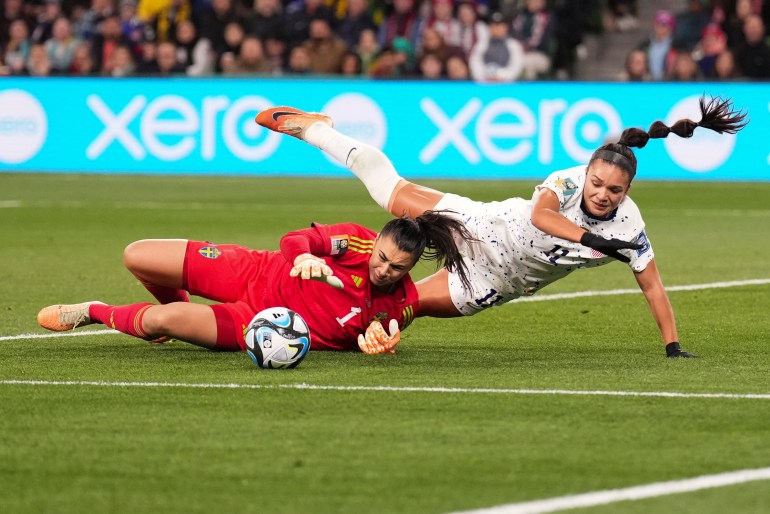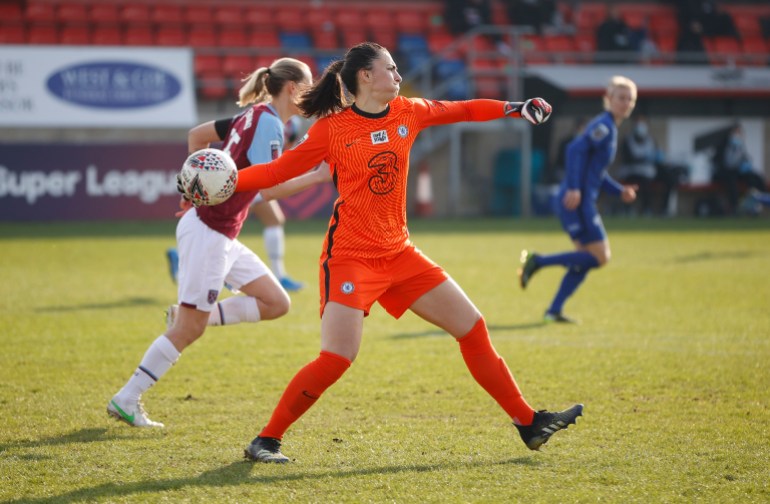Zecira Musovic, Sweden’s 27-year-old goalkeeper, has the answer.
Simply pull off three world-class saves in a match-winning performance against the tournament favourites to drag your country into the quarter-finals of the Women’s World Cup.
After Sweden’s dramatic penalty shootout victory over the United States in the round of 16 on Sunday, thousands of Swedes across the country took to social media to hail Musovic.
The goalkeeper, who had not been a household name before the game, ended the match a national hero as celebrities, including her favourite music artists, congratulated her online.

For all the noise and glamour surrounding the star-studded US team, it was a night where the determination of Sweden’s defence won the day – epitomised by Musovic’s heroics in goal.
It was a stunning trio of saves that helped a dogged Sweden survive a dominant US display, with Musovic tipping the ball onto the crossbar in the first half before making two acrobatic outstretched saves to deny Lindsay Horan and Alex Morgan in the second half.
She made a total of 11 saves as the match ended scoreless after extra time, with the Swedes progressing 5-4 on penalties.
Don’t know what to say pic.twitter.com/k7GCXTmpvn
— Zećira Mušović (@ZeciraMusovic) August 6, 2023
From backup to World Cup star
Musovic’s place as Sweden’s first-choice goalkeeper was not guaranteed. In the months before the tournament she had struggled to break into the first team at her club side Chelsea, behind Germany’s Ann-Katrin Berger and England’s Hannah Hampton in the pecking order.
Her lack of club-level appearances had put Jennifer Falk in the running to start for Sweden.
In the group stages, Manager Peter Gerhardsson only added to the uncertainty, playing Musovic in the first two games against South Africa and Italy but then fielding Falk in the final group game against Argentina. If his aim was to create competition to spur on Musovic, it seems to have worked.

A long road to success
Musovic’s story began among the scenic, rolling hills of Sweden’s central Dalarna county.
Her family comes from the Serbian town Prijepolje, near the border with Bosnia, but fled to Sweden in 1992, before she was born, to escape the Balkans war. Musovic’s three siblings were all born in Serbia.
The family later relocated to Helsinborg, the home city of legendary Celtic and Barcelona striker Henrik Larsson, where she began playing football for Stattena IF.
She would later recall how her extended family would make fun of the fact that as a girl, she was playing football.
“Most of the people in my surroundings questioned it and asked me when I would quit and start doing something that is more appropriate for a girl,” she wrote on her website. “Always when we went back to Bosnia for summer holiday, my boots was my number one in my packing. It was me and all the boys. Nothing I really reflected upon back then, much because I enjoyed it and wanted to do it. When that is the case, nobody can really stop me.”
In love with the game, she persisted and in 2012 joined FC Malmo, which merged with FC Rosengard in October 2013. Many trophies later in 2017, FC Rosengard faced Chelsea in a friendly at Carshalton Athletic where Musovic caught the eye of Chelsea’s recruitment staff, who pushed for a move to West London.

Musovic had the option to play for Serbia or Sweden but chose the latter, describing it as the country that had welcomed her family “with open arms”.
Musovic idolised her older brother, also a footballer, growing up.
“My brother was my biggest role model,” she wrote on her website. “I started kicking and running after a ball because of him; I took a bachelor’s degree in economics just like him and the similarities between us are remarkable. He has also been one of few that always supported me playing soccer and not just seeing it as a short-lived hobby.”
They said I couldn’t. They said I shouldn’t. But still, I did it. I followed my dream.@NextgenDreamers pic.twitter.com/qs3maTypKn
— Zećira Mušović (@ZeciraMusovic) June 4, 2023
Musovic recently launched a project encouraging young girls, with roots outside of Sweden, to dream of a sporting career.
In an open and personal interview with the Swedish newspaper Dagens Nyheter before the World Cup, Musovic spoke about the barriers she overcame, both societal and financial, to rise to the top of her game.
“It is not until now, that I have landed in my own story and understood that it has not always been so damn easy”, she reflected.
Better pay for women footballers
Musovic has also been vocal about the issue of better pay for women footballers. In interviews with Swedish media, she has expressed a nuanced view on the issue.
Rather than calling for an immediate levelling of pay, she believes in starting from the ground up, with teams investing in high-quality training pitches and physiotherapists to be able to develop the sport in the long term. Ultimately, she told Swedish newspaper Aftonbladet, these changes would lead to a development of the “financial aspect” of the women’s game and, in turn “generate more spectators”.
She even managed to change the mind of her boyfriend, Alen Bibic, an ice hockey player who had previously ignored the gender pay gap.
Musovic, he told Hockey Sverige magazine in 2019, had given him “another perspective” on the issue of pay after seeing that Musovic and her teammates put in the same amount of time and hard work as men do.

Straight-talker
Musovic has not been afraid to say what she thinks.
An energetic presence on social media, she has appeared just as comfortable sharing memes and jokes as commenting on serious political issues, including the French Senate vote to ban the hijab from sports competitions and the rise of the right-wing Swedish party, the Sweden Democrats.
“I think it comes from my family,” she told the Guardian in an interview in 2022. “Just to be confident enough in themselves to do that, leave everything behind, because there were people questioning them. That has formed me into someone that fights for what they want. I fight for what I think is important for me and what I believe in.”
In Sweden, she won plaudits recently for dismissing a question by a Brazilian journalist, who asked her if she knew Zlatan Ibrahimovic after her match-winning performance in the World Cup.
“In Sweden, everyone knows Zlatan,” she said firmly before moving on.
